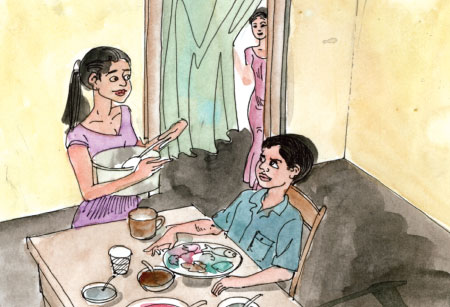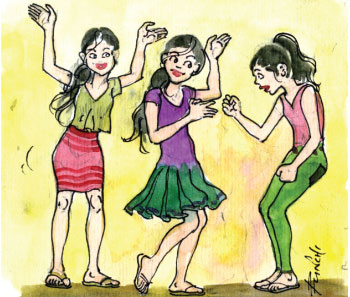|

by R. S. Karunaratne
'A little' and 'a few'
We use 'a little' with singular (uncountable) nouns.
Would you like to have a little soup?
She knows a little English.
I need a little help from you.
 |
|
The beauty queen gave me a
little smile |
Give him a little more rice.
We have a little trouble with the motor.
Add a little more sugar to my cup of coffee.
The beauty queen gave me a little smile.
It will take a little while for us to settle down in the new house.
I have a little problem with my motorcycle.
The fish curry needs a little more salt.
You need a little training to do any job.
I heard only a little of what they were talking.
We use 'a few' with plural nouns.
I have a few trusted friends.
I am going on holiday in a few days.
The cake will be ready in a few minutes.
I want to ask you a few more questions.
Father is going away for a few weeks.
She wants to buy a few things at the supermarket.
There are a few cakes left over from the party.
We have a few problems with our neighbours.
You should write a few more essays before the examination.
I am friendly with quite a few people here.
Rural students have only a few opportunities to speak English.
'Little' has a negative meaning similar to 'not much' or 'not many.'
There was little ice cream in the refrigerator.
I have little time to see films.
There is little water in the tank.
He has very little money.
There's so little choice.
Some people do as little as possible at work.
The carpenter did very little on Sunday.
Very little of what he said made any sense to me.
'Few' has a rather negative meaning similar to 'not much' or 'not
many.'
The lesson was so difficult that few students understood it.
Few people use Latin today.
Sam has few friends.
Few people attended his funeral.
The police received few complaints.
The benefits of the scheme are few.
I have few opportunities to speak French.
[Activity]
Fill in the blanks with 'little, a little, few' or 'a few' and check
your answers with the key.
 |
|
Give him a little more rice |
1. Add ............ salt to the soup.
2. ............ people voted for him.
3. Only .............. of these watches are genuine.
4. Only ........... of our employees have bank accounts.
5. I have quite ............ books on philosophy.
6. There was .............. time for swimming.
7. ............... is known about the side-effects of this drug.
8. .............. villages have such big buildings.
9. Tourists come here but ........... stay for a long time.
10. It rained ........... last night.
Key:
1. a little 2. A few 3. a few 4. a few 5. a few 6. little 7. Little
8. Few 9. few 10. a little
Match words and meanings
Here's an exciting way to enrich your vocabulary. Match the words in
column 'A' with their meanings in column 'B' and check your answers with
the key. The first has been done for you.
[Column A]
Y 1. decency
... 2. decent
... 3. decibel
... 4. decide
... 5. decidedly
... 6. deck
... 7. deckhand
... 8. declaim
... 9. declamation
... 10. declaration
... 11. decline
... 12. decommission
... 13. decompose
... 14. decompress
... 15. decontaminate
... 16. decontrol
... 17. decorative
... 18. decorous
... 19. decorum
.. 20. decrease
... 21. decree
... 22. decrepit
... 23. decriminalise
... 24. decry
... 25. dedicate
[Column B]
A. socially acceptable
B. unskilled worker on a ship
C. polite behaviour
D. to remove official control on something
E. to choose something after thinking carefully
F. to remove dangerous substances from something
G. a strong statement
H. to become less
I. made to look attractive
J. certainly and obviously
K. in very bad condition
L. to stop something from being illegal
M. behaving politely
N. decorate
O. an announcement
P. to take equipment out of use
Q. to return to the original size
R. an official statement that something must happen
S. to criticise something as bad
T. to give your energy and time completely
U. to decay
V. to gradually become less
W. to express something with strong feelings
X. a unit for measuring the loudness of sound
Y. good behaviour
Key:
2. A 3. X 4. E 5. J 6. N 7. B 8. W 9. G 10. O 11. V 12. P 13. U 14. Q
15. F 16. D 17. I 18. M 19. C 20. H 21. R 22. K 23. L 24. S 25. T
Personal pronouns
"I, we, us, you, he, him, she, her, it, they" and "them" are personal
pronouns. "I, me, we" and "us" belong to the first person. "You" belong
to the second person. "He, she, it, he, him, her, they" and "them"
belong to the third person. We use the subject form "I" when the pronoun
is the subject and there is a verb following it. We use the "be verb"
"am" and "was" with "I."
[Present tense]
 |
|
We are dancers |
I am a student.
I am a nurse.
I am a teacher.
I am a driver.
I am a lawyer.
[Past tense]
I was a student.
I was a nurse.
I was a teacher.
I was a clerk.
I was a lawyer.
"We" is the plural form of "I." We use the "be verbs" "are" and
"were" with it.
[Present tense]
We are fishermen.
We are conductors.
We are doctors.
We are dancers.
We are policemen.
[Past tense]
We were surveyors.
We were planters.
We were sailors.
We were pilots.
We were scientists.
With "he, she" and "it" we use the "be verbs" "is" and was."
[Present tense ]
He is a cultivator.
She is a seamstress.
It is an umbrella.
He is a carpenter.
She is a nurse.
[Past tense ]
He was a veterinary surgeon.
She was a typist.
It was a dog.
He was a driver.
She was a model.
[Past tense (Plural)]
They were swimmers.
They were divers.
They were seamen.
They were robbers.
They were observers.
With "we" we use the "be verbs" "are" and "were."
[Present tense]
We are soldiers.
We are janitors.
We are prisoners.
We are judges.
We are cleaners.
[Past tense]
We were thieves.
We were salesmen.
We were blacksmiths.
We were policemen.
We were guards.
With "you" we use the "be verbs" "are" and "were."
[Present tense]
You are late.
You are beautiful.
You are very kind.
You are jealous of me.
You are taller than me.
[Past tense]
You were driving too fast.
You were at home yesterday.
You were the chief guest.
You were playing cricket.
You were running very fast.
We use "you" or "one" to mean "any person" or "people in general."
You should be punctual.
You can wait for me.
You are a brilliant speaker.
You are not very rich.
You are leaning very fast.
One should expect to meet such difficult people.
One shouldn't believe everything others say.
One doesn't like to be insulted in public.
Note: "You" is normal in conversation. "One" is more formal than
"you."
We use "they" for other people in general. It is a vague pronoun.
They say that XYZ Party will come back to power.
They say too much salt and sugar is bad for health.
They are going to build a new bridge across the river.
Note: "They" is normal in conversation. We use the passive form in
more formal situations.
A new bridge is being built across the river.
Quiz on idioms
An idiom is a special kind of phrase. It is a group of words which
have a different meaning when used together from the one it would have
if the meaning of each word were taken individually. Tick the meaning of
each idiom in bold and check your answers with the key.
1. The wheel has come full circle.
(a) it is now exactly the same as it used to be
(b) the wheel is very old now
(c) you have completed a particular job very well
2. If you find yourself in a vicious circle ...
(a) you are in for trouble
(b) you are in an orderly situation
(c) you are in a chaotic situation
3. If someone is going round in circles ...
(a) they are advancing in their career
(b) they are not achieving very much
(c) they are in for a surprise
4. If someone shuts up like a clam ...
(a) they become very quiet and withdrawn
(b) they become very noisy
(c) they become very excited
5. If you drop a clanger ...
(a) you surprise everybody
(b) you make a very embarrassing mistake
(c) you leave a place suddenly
6. If someone does something like the clappers ...
(a) they don't do it
(b) they do it very slowly
(c) they do it very quickly
7. If someone gets their claws into you ...
(a) they control you in a selfish way
(b) they irritate you
(c) they praise you
8. If something is clean as a whistle ...
(a) it is very dirty
(b) it is very clean
(c) it is very expensive
9. If you come clean about something ...
(a) you tell the truth about it
(b) you do not tell the truth about it
(c) you escape from a dangerous situation
10. If someone is taking you to the cleaners ...
(a) they are going to rob you
(b) they are going to bathe you
(c) they will make you to lose a lot of money in an unfair way
Key:
1. (a) 2. (c) 3. (b) 4. (a) 5. (b) 6. (c) 7. (a) 8. (b) 9. (a) 10.
(c) |

